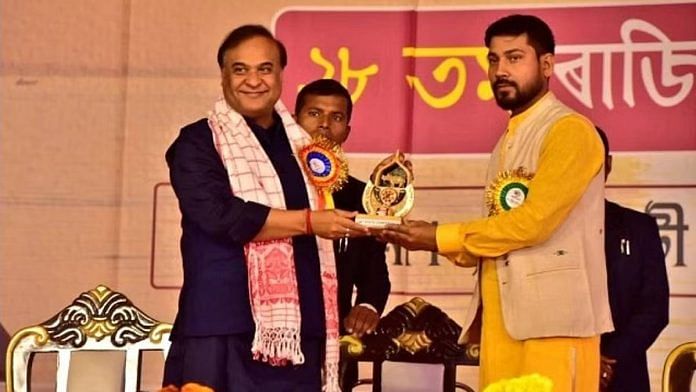Guwahati: Assam chief minister Himanta Biswa Sarma has begun the new year with a controversy – suggesting that Bagh Hazarika, the 17th century Muslim warrior who fought the Mughals alongside legendary Ahom general Lachit Barphukan, is a fictional character.
This has enraged a section of Muslim leaders who perceive it as a “right-wing ploy to provoke the community and divide Assamese society”.
Through his speeches at recent public functions, Sarma, who belongs to the BJP, dug into the hows and whys of the history of Assam, and the Battle of Saraighat fought in March 1671.
“If you read the entire history of the Battle of Saraighat, you will find there’s no mention of Bagh Hazarika anywhere,” he said at two recent events – while addressing the state convention of the Akhil Bharatiya Vidyarthi Parishad in Guwahati on January 8, and on January 12, at a Bharatiya Janata Yuva Morcha, Assam Parishad, programme in the city marking the birth anniversary of Swami Vivekananda.
The Battle of Saraighat was a naval battle between the Ahom Kingdom and the Mughal Empire on the Brahmaputra River, close to Saraighat (now in Guwahati). The Ahom army was led by Barphukan while Ram Singh was the central commander of the Mughal Army.
The Ahoms under the leadership of Barphukan and chief counsellor Atan Buragohain dealt a mortal blow to Mughal expansionist ambitions.
“It is very unfortunate that a chief minister is making such a statement. The name of Bagh Hazarika features in Assam’s history. We would encourage more research, if someone has doubts, than creating unnecessary controversy. The right-wing would never want to recognise any Muslim historical evidence. It’s the same hidden agenda this time as well,” said political activist Mehdi Alam Bora.
A statement issued by 10 Assamese Muslim intellectuals and scholars on 11 January has requested the state government to constitute a committee of historians under a university in Assam to find out more about warrior Bagh Hazarika, whose real name was Ismail Siddique.
The 10 people include professors Abu Nasser Syed Ahmed and Poynuruddin Ahmed, former minister Samsul Huda, political activist Mehdi Alam Bora, and Kazi Nekib Ahmed and Mushtaq Golam Osmani of the Bagh Hazarika Research Forum.
Moinul Islam, president of Sadou Asom Goria Jatiya Parishad, a body of indigenous Assamese Muslims, told ThePrint: “There is not enough documentation to prove that Bagh Hazarika lived and fought against the Mughals in Assam, but his name finds mention in history. This issue is a political conspiracy by vested groups, including migrants who have settled in Assam.”
Also read: With Lachit Barphukan, BJP is giving a history lesson to Congress on how to remember icons
‘Cannot be dismissed as fiction’
In 1947, the Government of Assam, Directorate of Historical and Antiquarian Studies, published Professor Surya Kumar Bhuyan’s (1894-1964) book ‘Annals of the Delhi Badshahate: Being a Translation of the Old Assamese Chronicle Padshah-Buranji, with Introduction and Notes’.
In the 244-page book, a footnote on ‘Assamese Muhammadan Commanders’ contained in Page 231, makes a mention of Bagh Hazarika – “whose military genius was partly responsible for the success of Lachit Barphukan’s operations against Ram Singh. It was heard from Maulavi Mufizuddin Ahmed Hazarika, author of Jnan-Malini, and Government Literary Pensioner, Dibrugarh, a descendant of the said Bagh Hazarika”.
Noted Assamese writer and poet, and former Assam Director General of Police, Harekrishna Deka told ThePrint that the existence of Bagh Hazarika cannot simply be dismissed as fictitious because written histories of Assam do not mention his name.
“His legendary exploits may be part of oral history, having been in folklore for a pretty long time. Historian Surya Kumar Bhuyan writes in Delhi Badshahate that Bagh Hazarika’s name and exploits became known from his descendent Mafizuddin Ahmed Hazarika, an eminent Assamese poet, who had his knowledge through family tradition,” said Deka.
“This knowledge of ancestral history transmitted from mouth to mouth can’t simply be dismissed as fiction until conclusively proved otherwise,” he added.
Others interested in the study of regional history, but who did not wish to be named, said there must be some strong evidence to deny Hazarika’s existence, and that there is scope for further research and discussion, without creating chaos.
Muslims in Assam
CM Sarma has acknowledged the contribution of Assamese Muslims in the social fabric of the greater Assamese society.
At the January 12 event, he said about the community: “They must possess independent thoughts, and politically too, they should be willing to sacrifice everything to protect our Jaati-Maati-Bheti. If we move ahead with such a vision, we will remain undefeated”.
Referring to history, Alam Bora said: “Muslims have contributed equally in building Assamese society, alongside the Ahoms. Muhammad Bin Bakhtiyar, a Turk of the Khilji tribe, had invaded Kamrupa (ancient Assam) in 1205 AD, but suffered a defeat – you will find this inscribed as a Sanskrit couplet on a rock in north Guwahati.”
In the ‘Annals of Delhi Badshahate’, Bhuyan wrote about Ghiyasuddin Iwaz-is-Hussain Khilji, Sultan of Gaur, who invaded Assam in 1226, but was defeated and compelled to return to Gaur.
Sarma, in his recent speeches, has also accused Left writers and historians of “distorting” Indian history by making it a tale of defeats and submission, to which Bora remarked: “Does the CM mean to say that historian Surya Kumar Bhuyan or Bodo novelist Medini Choudhury and other Assamese writers were Leftists?”
The controversy over Bagh Hazarika began during the celebration of Barphukan’s 400th birth anniversary in November 2022. On that occasion, the Hindu Jagran Manch had said Bagh Hazarika was a fictional character without any “symbolic representation” in Assam’s history.
(Edited by Nida Fatima Siddiqui)
Also read:



